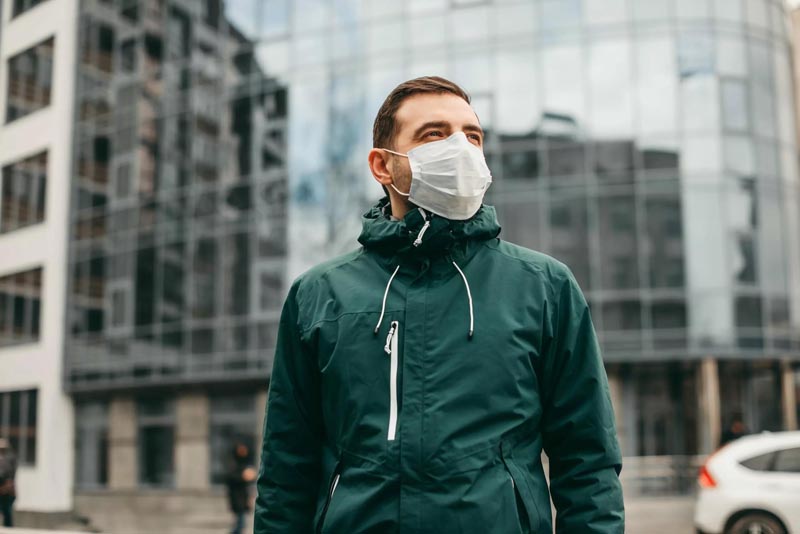COVID-19 Has Impacted Dentists, as Well

The world is facing an unprecedented threat, unlike anything we have seen in modern times. Within our great state of Texas and the United States to countries all across the globe, millions of lives are being impacted by the emergence of a brand-new novel coronavirus, known as COVID-19. COVID-19 first surfaced in December 2019 in a food market in Wuhan City, Hubei Province, China. Shortly after its discovery, the virus made its way across China, eventually crossing Chinese borders and invading surrounding countries. In a few weeks, thanks to international travel, COVID-19 made its way to continents and countries thousands of miles away. After it spread across several continents, the World Health Organization (WHO) declared COVID-19 a global pandemic in early March 2020.
A few days after WHO’s statement, Governor Greg Abbott declared that Texas was officially in a state of emergency. More and more bodies of government in the U.S. and around the world quickly began to recognize the very real and credible threat COVID-19 presents the public. It has forced the hands of many governments, as they have had to make difficult decisions in order to ensure the public is protected. Many businesses have been forced to close their doors for the time being. However, many businesses, especially those in healthcare, remain open, including dental care clinics, such as Cosmetic & Family Dentistry of Las Colinas.
We are closely following this pandemic as it progresses to ensure that while we are still able to provide dental services, we are able to keep our patients, staff, and community healthy and safe. If you have any questions regarding our changed services at this time, do not hesitate to contact us.
What Is COVID-19?
As we have mentioned, COVID-19 is the most recent coronavirus to plague the world. It is one in a family of zoonotic viruses that travel from animals to humans, inflicting illnesses that range from something as mild as the common cold to something severe and life-threatening. While COVID-19 has caused the world to come to a halt, it isn’t the first coronavirus to threaten the lives of people across the globe.
Back in 2003, SARS made itself known when it first emerged in Asia and claimed the lives of nearly 800 people. Then in 2012, an outbreak of MERS started in Saudi Arabia and eventually lead to over 800 deaths.
At the time of this writing, COVID-19 has caused:
- Over 1.4 million confirmed cases worldwide
- Over 85,000 confirmed deaths worldwide
To keep up with the ongoing spread of this virus, visit the WHO’s website, where they provide daily updates and resources regarding this disease. You must be aware of the symptoms of this disease not only to seek the treatment you may need but to protect those around you, as well. These symptoms are:
- Fever
- Dr.y cough
- Shortness of breath
- Tiredness
- Nasal congestion
- Runny nose
- Sore throat
NOTE: The incubation period for COVID-19 is between 1-14 days, so if you do contract the virus, you may not show symptoms until two weeks later. If you encounter a sick individual, you should self-isolate to reduce the risk of further spreading this virus.
Impact on Dentists
As we’ve mentioned already, governments have been put in a difficult position that forced them to make decisions that impact the livelihoods of many citizens. Even though these orders were made with the health and safety of the public in mind, they still have made an impact on certain communities. In Texas, Governor Greg Abbott extended his executive order, which was initially supposed to end April 3, to April 30. In this order, Abbott banned the gathering of ten or more people, prohibited eating or drinking in restaurants and bars (however, take-out and delivery are still available), closed gyms, and temporarily closed schools.
Dallas County released FAQs, which explained what is an essential activity, essential business, and non-essential business. Dentists, along with other healthcare professionals and clinics, are considered an essential business. Cosmetic & Family Dentistry of Las Colinas will remain closed throughout the month of April in accordance with Governor Abbott’s executive order.
Our Response
Our offices have laid out an action plan to ensure the health and safety of our staff and patients. Dr. Naik will continue to see patients in the event of a dental emergency. For those that have a scheduled elective appointment, someone from our office will contact you to reschedule your appointment. If you do have emergency dental needs, please contact Cosmetic & Family Dentistry of Las Colinas today.
Our clinic has done this on the recommendation of the Center for Disease Control and Prevention (CDC). This comes off of the recommendation made by the American Dental Association. Here, they explain that clinics should prioritize emergency services and reschedule elective appointments. The appointments they list out that dentists should reschedule include:
- Visits for exams, cleanings, and x-rays
- Visits for braces
- Extraction of non-painful teeth
- Teeth whitening
- Treatment of non-painful cavities
They explain dentists should prioritize appointments, such as:
- Nonstop bleeding
- Painful swelling in or around the mouth
- Pain in teeth or jawbone
- Painful and swollen gum infections
- Post-surgery treatment
- Broken or knocked-out teeth
The reasoning for these changes is because dental settings have “unique characteristics that warrant additional infection control considerations.” Those who work in dental care are at a heightened risk of contracting COVID-19, so they must be extra cautious. The CDC states that COVID-19 is spread through respiratory droplets, and dental instruments cause droplets to fly up. These droplets could potentially contain the virus and spread it further.
It has always been our priority to provide our patients with the highest level of care imaginable. Unfortunately, during the ongoing pandemic, doing so would put our patients and staff at risk. If you are experiencing a dental emergency, however, please contact us to learn how we can still help.
- Awareness16
- Bad Breath1
- Bone Grafting1
- Braces4
- Causes, Symptoms, And Treatments6
- Cavities5
- Chewing Gum1
- Cosmetic Dentistry of Las Colinas15
- COVID-192
- Deep Cleaning7
- Dental Anxiety1
- Dental Bridge2
- Dental Care27
- Dental Cleaning6
- Dental Crown1
- Dental Filling1
- Dental Health24
- Dental Implants6
- Dental Sedation1
- Dental Visit1
- Dental X Ray3
- Floss1
- Gum Dieseases4
- Injury1
- Insurance1
- Invisalign8
- Oral Cancer1
- Oral Hygiene24
- Root Canal9
- Sleep Apnea2
- Tartar1
- Teeth19
- Thanksgiving1
- TMJ1
- Tongue1
- Veneers2
- White Teeth12
Get Your Best Smile With Us
